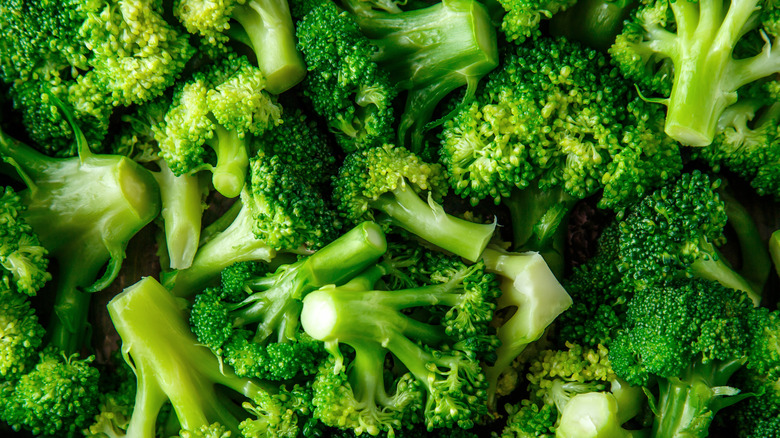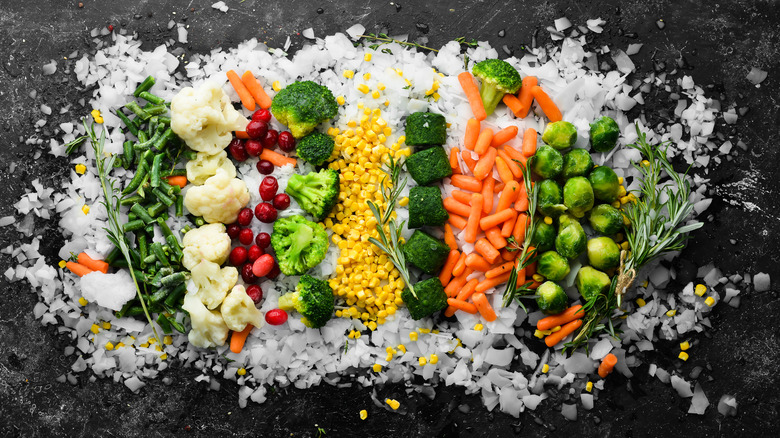Why You Should Always Choose Frozen Greens Over Canned
The basis for modern freezing techniques originated 100 years ago. Per the Library of Congress, Clarence Birdseye happened on today's quick-freezing concept while fishing in Newfoundland. He realized fish that quickly froze in the frigid conditions still maintained their taste and texture when thawed several months afterward. According to Healthy Food Guide, canning dates to the 19th century experiments of Nicholas Appert, who used glass jars to preserve food for the French military. Louis Pasteur subsequently made the connection between microorganisms and food spoilage, and cans were eventually used as a less expensive and more durable alternative to glass.
Frozen greens or other produce are initially briefly immersed in boiling water or steam to kill bacteria and deactivate enzymes that would break down the food. They are then promptly flash frozen and packaged in an airtight container. This blanching vegetable procedure is designed to lock in nutrition while stabilizing food quality. Canning requires additional processing steps and a longer exposure to heat than freezing. Britannica explains that canned contents are first cleaned and blanched, then placed in the container. Air is expelled by replacing it with liquid, and the food is heated. The can is then sealed and sterilized.
The differences in quality between frozen and canned greens may not be as great as generally believed. However, according to experts at Clemson University and others, canning may have its good points but freezing will ensure a superior result.
Freezing is better than canning
Canning's extra steps impact taste, texture, and color, and might affect the nutritional profile as well. FAO describes freezing favorably as a method of preservation, and Henry Ford Health also prefers it. It is critical of brine solutions, sugar, and other substances often added to canned goods, and recommends rinsing the contents to eliminate the additives. Nutrition is lost in the process.
Produce discolors after harvesting, and freezing halts that oxidation. Vitamin C is a nutrient affected by outside factors, and the American Council of Science and Health calculated that canning depletes it more than freezing. They determined that the Vitamin C content in canned food dipped by 60% compared to 50% in its frozen counterpart. The canning process also reduces other water-soluble nutrients such as the B vitamins. Per Medical Association of North Arkansas, with the exception of canned pumpkins and tomatoes, frozen has a higher nutritional content than canned. Frozen broccoli is a healthy green that can reduce cholesterol, improve iron absorption, and aid digestion. Per Green Giant, frozen broccoli is more riboflavin-laden than even the fresh version, and canned broccoli is non-existent.
Convenience is another factor that separates frozen and canned greens. A large bag of frozen vegetables is cost-effective. Packaged frozen food also lends itself to portion control, and it can be microwaved without even removing it from the sack. In addition, a selection of vegetables can be blended in the same bag, providing a level of variety missing in cans.
Why canning is inferior to freezing
According to Safecastle, frozen greens are closer than canned ones to the fresh variety. They are not subject to prolonged boiling, a canning process that quashes bacteria and prevents spoilage but also depletes nutritional value. Another reason to eschew canned products over frozen ones is the containers themselves. Bisphenol-A (BPA), a chemical linked to cancer, heart disease, and other ailments, is frequently used to line the inside of cans. Per Examine, food's acidity or the sterilization process itself can cause BPA to leak and infiltrate the contents. A dented or swollen can might be tainted with bacteria, even potentially deadly clostridium botulinum — a hazard absent in frozen food. Sugar and salt are frequently added to canned goods in large amounts. An individual on dietary restrictions should therefore be wary and seek out the frozen variety. The U.S. Department of Agriculture also warns that canned asparagus (when stored in jars) is treated with the preservative stannous chloride.
Freezing is not without its flaws, however. Houston Methodist cautions that the vegetable side dish in a frozen TV dinner is apt to be riddled with more salt than expected. Some frozen foods might be treated with ascorbic acid as a preservative, or contain binders or emulsifiers. In any case, whether frozen or canned, make sure to eat the recommended daily dose of greens and other vegetables.


